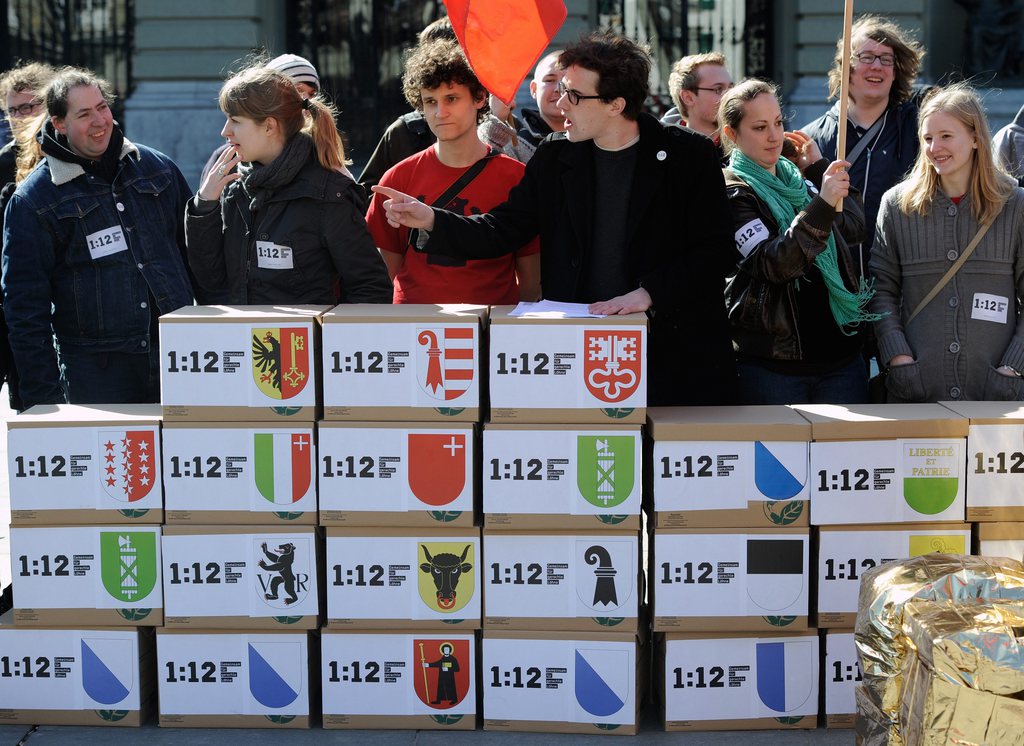Initiative takes aim at inherited millions

A proposed tax on legacies over CHF2 million ($2.1 million), to be voted on in June, is intended to redistribute wealth and ensure funding of old age pensions. Opponents say the new levy would increase the tax burden and threaten the survival of many businesses.
In Switzerland, wealth is more and more concentrated in the hands of a few.
In 1990, 1% of the taxpayers possessed 30% of the national net wealth, while today the figure is 40%.
This is according to data from the Federal Tax AdministrationExternal link. Taking into account the considerable resources of these taxpayers for fiscal “optimisation”, it may be that the percentage is actually higher.
To put a stop to the increasing concentration of wealth, the political left has come up with several recent people’s initiatives aiming to reduce income disparities and achieve greater equity in taxation.
In the last two years the voters have had their say on three proposals and rejected them all: an initiative aimed at 1:12 pay caps within companies, an initiative for the introduction of a nationwide minimum wage and another one to scrap lump sum taxation for rich foreigners.
With this new initiative to “tax millionaires’ legacies to fund old age pensions”, which goes to a nationwide vote on June 14, leftwing parties and trade unions, led by the small centrist Protestant Party, are proposing to reform the system for taxation of inheritances and gifts to improve the redistribution of national wealth.
Currently this kind of taxation falls under the jurisdiction of the 26 cantons, all of which have their own regulations as regards taxation rates and the categories of persons affected.
Equitable and liberal
The initiative proposes to transfer the right to collect this tax to the federal government.
Only estates and gifts of over CHF2 million would be taxed, at a basic rate of 20%. Spouses and “registered partners” (in same-sex unions) would not be liable for the tax, while direct descendants would have to pay.
Launched by the Protestant Party and supported by Social Democrats, Greens and trade unions, the initiative wants to reform taxation of inherited fortunes and gifts, trasferring the power to tax from the cantons to the federal level.
The proposed tax would apply only to estates and gifts over CHF2 million, at a rate of 20%. The rate would be less for those who inherit businesses and farms and keep up the activity for ten years at least.
Bequests and gifts to a spouse or “registered partner” would be exempt, as also gifts up to CHF20,000.
Two thirds of the revenue from the new tax would go to Switzerland’s old age pension fund and the remaining third to the cantons. Currently all cantons except Schwyz have an inheritance tax.
Two thirds of the revenue from this new tax, projected at CHF3 billion a year, would be credited to the nation’s old age pension fund, with the remaining third going to the cantons to compensate them for the loss of their inheritance tax revenue, which currently generates a total amount of about CHF1 billion a year.
As for gifts, the tax would apply retroactively from January 1, 2012, so as to avoid attempts at evasion before it comes into force.
For politicians on the left, the new tax is not only equitable but corresponds to liberal principles, it being juster to tax an inheritance than income earned from one’s own work.
People who inherit money do not earn it, the argument goes; they just have the good fortune to be born into a wealthy family.
According to advocates of the initiative, the revenue from this tax would allow Switzerland to deal with the growing burden of funding old age pensions due to the country’s ageing population.
Cantonal sovereignty
The initiative is being opposed by the government, which intends to top up the old age pension fund with an increase of up to two percentage points in sales tax (VAT) as part of a wide-ranging reform of old-age insurance.
According to the finance ministry, the left’s proposal would bring an increase in the tax burden for many heirs, given that currently only three cantons tax direct descendants, and it might lead to an exodus of wealthy taxpayers from Switzerland.
Supported by the cantonal finance directors, the government opposes a transfer of powers to the federal level as being interference with the sovereignty of the cantons and a restriction on the scope of tax “competition” within the country.
The government also expects there would be a drop in the tax revenue of cantons overall.
Old age pensions
This reasoning is rejected by the advocates of the initiative.
“Our proposal aims in the first instance to guarantee funding for old age pensions,” argues Social Democratic parliamentarian Christophe Schwab.

More
Rich cast nervous eye at inheritance tax plan
“This is a federal institution, so it seems logical to us to have the funding mechanism at federal and not cantonal level. Maybe some cantons will see revenues go down, but others will get more than they are getting now.”
In Schwab’s view, a reduction of tax competition and tax tourism as regards inheritances can only help the country as a whole.
Family businesses threatened
The sovereignty of cantons in tax matters is also being defended by the centre-right majority in parliament, which is mounting a united front against the initiative.
Campaigners against the initiative have criticised the retroactivity of the gift tax, which they consider contrary to current law.
In their opinion the left’s proposal is also unfair: a person inheriting up to CHF1.99 million would pay no tax, while four heirs who inherit (say) CHF525,000 each from an estate of CHF2.1 million would be taxed.
According to opponents, the new tax would add to the tax burden in Switzerland, to the disadvantage of business.
“Switzerland is one of the few European countries that still has a wealth tax. If the initiative were to be accepted by the people, we would have triple taxation: tax on income, on wealth, and on inheritances, ” says Jean-François Rime.
The parliamentarian for the conservative right Swiss People’s Party and president of the Association of Small and Medium-Sized Enterprises thinks the initiative threatens the future of many family-owned companies.

More
Wealth gap could provoke a social explosion
“The introduction of a tax at a rate of 20%, applied to direct descendants, is liable to make succession difficult in many businesses. To pay the tax, many heirs would have to sell their business or not make investments for many years,” Rime argues.
Shocking inequalities
Schwab defends the initiative against the critics.
“The text indicates clearly that the rate of 20% is to be reduced for those inheriting businesses or farms and continuing the activity for at least ten years. The amount is to be fixed as part of the legislation,” he says.
“It should also be noted that, while few countries tax both wealth and inheritances, the overall tax burden in Switzerland is still one of the lowest in Europe,” Schwab continues.
“Switzerland suffers from a widening wealth gap which, in the long term, is liable to endanger not only social cohesion, but economic development too. This gap is all the more shocking in a rich country like ours, where many working people and families have to apply for social assistance to get past the end of the month.
“The initiative is particularly equitable, since it will tax only legacies in the millions and is designed to strengthen the old age pension system, the social institution with the greatest solidity – and the greatest solidarity – in Switzerland,” he argues.
Four separate issues come to a nationwide vote:
Beside the proposal for an inheritance tax, an initiative to introduce a nationwide scheme for student grants seek voters’s approval.
A constitutional amendment to allow the screening of embryos and a reform of the funding scheme for public radio and TV in Switzerland are also awaiting a verdict.
Translated from Italian by Terence MacNamee

In compliance with the JTI standards
More: SWI swissinfo.ch certified by the Journalism Trust Initiative
















You can find an overview of ongoing debates with our journalists here . Please join us!
If you want to start a conversation about a topic raised in this article or want to report factual errors, email us at english@swissinfo.ch.